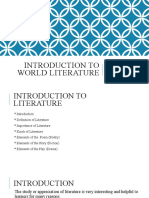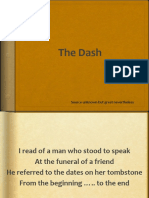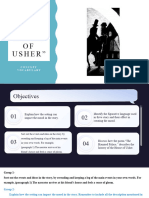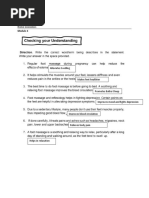0 ratings0% found this document useful (0 votes)
87 viewsNothing Gold Can Stay
Nothing Gold Can Stay
Uploaded by
akuismeudyThis poem discusses how nothing in life can stay pure and innocent forever. It uses the metaphor of a leaf to represent how childhood ("Nature's first green") is beautiful but fleeting, as youth fades ("so Eden sank to grief") and innocence is lost ("Nothing gold can stay"). The poem suggests that life follows a natural cycle from innocence to experience, and that we should cherish life's beautiful moments because they do not last.
Copyright:
Attribution Non-Commercial (BY-NC)
Available Formats
Download as PPTX, PDF, TXT or read online from Scribd
Nothing Gold Can Stay
Nothing Gold Can Stay
Uploaded by
akuismeudy0 ratings0% found this document useful (0 votes)
87 views9 pagesThis poem discusses how nothing in life can stay pure and innocent forever. It uses the metaphor of a leaf to represent how childhood ("Nature's first green") is beautiful but fleeting, as youth fades ("so Eden sank to grief") and innocence is lost ("Nothing gold can stay"). The poem suggests that life follows a natural cycle from innocence to experience, and that we should cherish life's beautiful moments because they do not last.
Copyright
© Attribution Non-Commercial (BY-NC)
Available Formats
PPTX, PDF, TXT or read online from Scribd
Share this document
Did you find this document useful?
Is this content inappropriate?
This poem discusses how nothing in life can stay pure and innocent forever. It uses the metaphor of a leaf to represent how childhood ("Nature's first green") is beautiful but fleeting, as youth fades ("so Eden sank to grief") and innocence is lost ("Nothing gold can stay"). The poem suggests that life follows a natural cycle from innocence to experience, and that we should cherish life's beautiful moments because they do not last.
Copyright:
Attribution Non-Commercial (BY-NC)
Available Formats
Download as PPTX, PDF, TXT or read online from Scribd
Download as pptx, pdf, or txt
0 ratings0% found this document useful (0 votes)
87 views9 pagesNothing Gold Can Stay
Nothing Gold Can Stay
Uploaded by
akuismeudyThis poem discusses how nothing in life can stay pure and innocent forever. It uses the metaphor of a leaf to represent how childhood ("Nature's first green") is beautiful but fleeting, as youth fades ("so Eden sank to grief") and innocence is lost ("Nothing gold can stay"). The poem suggests that life follows a natural cycle from innocence to experience, and that we should cherish life's beautiful moments because they do not last.
Copyright:
Attribution Non-Commercial (BY-NC)
Available Formats
Download as PPTX, PDF, TXT or read online from Scribd
Download as pptx, pdf, or txt
You are on page 1of 9
NOTHING GOLD CAN STAY
BY ROBERT FROST
NOOR ANIS SYAKIRIN MOHD AFFANDI
NORSARA AKMA MOHD NUSIR
NURFAZILA MOHD ZAM ZAM
NUR ADIBAH ABDUL LATIF
NOTHING GOLD CAN STAY
BY
ROBERT FROST
NOTHING GOLD CAN STAY
BY
ROBERT FROST
• Nature's first green is gold,
Her hardest hue to hold.
Her early leaf's a flower;
But only so an hour.
Then leaf subsides to leaf.
So Eden sank to grief.
So dawn goes down to day.
Nothing gold can stay
SYNOPSIS
• When you are born and are a child you are gold or innocent
and pure.
• You are unaware of the world as a child. Your childhood is the
hardest thing to hold on to.
• Childhood is the first part of your life. But it only last a while.
• As you grow up you loose that innocence, you learn to be
strong and confident.
• You face hardships throughout your life. You begin to loose the
golden innocence of your childhood and build a layer of
confidence and security as you go into adulthood to fight and
protect yourself from the world.
• Sooner or later you're going to die. So don't
take life for granted. Like the poem says "So
dawn goes down to day" means when your
gold you a kid and everything is new to you.
• When you get older you lose your innocence
and that is day; when nothing is new anymore.
• Youth doesn't last forever. Also it means to
cherish your life because one day we will die
THEMES
• The Fleetingness of Youth
• Mortality and The Shortness of
Life
• Loss of Innocence
The Fleetingness of Youth
• In each of these cases, the poem emphasizes
the beauty of youth but also its fleeting nature:
• "Nature's first green" is also the "hardest hue
to hold", the earliest leaf is a beautiful flower
but "only so an hour", and the "dawn goes
down to day".
• Youth, while one of life's most beautiful times,
cannot be held onto.
Mortality and The Shortness of Life
• The "cycle of life" is alluded to in the poem
and although in its literal sense the poem
discusses only the life-cycle of the leaf and of
the day, the reader is forced to look past this
and at the cycle of their own life.
• Its show in the line "then leaf subsides to leaf."
One leaf is replaced by another just as
newborns replace those who grow old and die
Loss of Innocence
• Is a tendency to associate youth with
innocence and as a result to pick this theme
out of the same references to dawn, the "early
leaf" and Nature's early colors
You might also like
- Ces Questions Sorted by WordsDocument619 pagesCes Questions Sorted by WordsAdnana Cadar100% (3)
- Washington Black LitChartDocument83 pagesWashington Black LitChartJeniNo ratings yet
- Reading On The Move: Poetry: Form, Syllables, Mood, and ToneDocument12 pagesReading On The Move: Poetry: Form, Syllables, Mood, and ToneJustine Jorel Jayag CarmenNo ratings yet
- Plague & Pestilence Player's SheetDocument2 pagesPlague & Pestilence Player's SheetByram JNo ratings yet
- Feedback Mechanisms and Menstrual CycleDocument90 pagesFeedback Mechanisms and Menstrual CycleThird WillowNo ratings yet
- The Poetry of Yehuda AmichaiDocument7 pagesThe Poetry of Yehuda Amichaiearthpig707No ratings yet
- Lesson On Political PoetryDocument2 pagesLesson On Political PoetryFl HaineNo ratings yet
- Nothing Gold Can StayDocument7 pagesNothing Gold Can StayMaizaton Akhmam MahamadNo ratings yet
- Reflection Paper Rubric PDFDocument1 pageReflection Paper Rubric PDFClint Richard ChuaNo ratings yet
- Mass Propers For Our Lady of The RosaryDocument3 pagesMass Propers For Our Lady of The RosaryAaron Ricardo VelosoNo ratings yet
- Thanksgiving Lesson 8Document6 pagesThanksgiving Lesson 8api-403670756No ratings yet
- Analysis Paper Model (Nothing Gold Can Stay)Document2 pagesAnalysis Paper Model (Nothing Gold Can Stay)LarryKnightNo ratings yet
- Intermediate English - The Story of Blue JeansDocument2 pagesIntermediate English - The Story of Blue Jeanssherylin4uNo ratings yet
- Lit Crit and TheoriesDocument47 pagesLit Crit and TheorieskcapuzNo ratings yet
- Amorak Huey_ W. Todd Kaneko - Poetry_ a Writer's Guide and Anthology-Bloomsbury Writer's Guides and (2024)Document307 pagesAmorak Huey_ W. Todd Kaneko - Poetry_ a Writer's Guide and Anthology-Bloomsbury Writer's Guides and (2024)skaitlyn81204No ratings yet
- Fasselt, Rebecca - Interview With Yewande Omotoso, AfropolitanismDocument16 pagesFasselt, Rebecca - Interview With Yewande Omotoso, Afropolitanismjen-leeNo ratings yet
- Introduction To LiteratureDocument25 pagesIntroduction To LiteratureJoylene De la VictoriaNo ratings yet
- Poems, Songs & SpeechesDocument10 pagesPoems, Songs & SpeechesShiela Mae Cruz100% (1)
- English Hymnal 2017 Press FinalDocument515 pagesEnglish Hymnal 2017 Press Finalespinozadavidjed916No ratings yet
- Nothing Gold Can Stay-SummaryDocument1 pageNothing Gold Can Stay-Summarynuru91No ratings yet
- Unit Plan 2Document23 pagesUnit Plan 2api-24981552250% (2)
- ImagismDocument5 pagesImagismErnst LudwigNo ratings yet
- Drama As A Literary GenreDocument9 pagesDrama As A Literary GenreRoselynLaurelNo ratings yet
- How Languages Work An Introduction to Language and Linguistics 2nd Edition Carol Genetti download pdfDocument65 pagesHow Languages Work An Introduction to Language and Linguistics 2nd Edition Carol Genetti download pdfmolandizio0t100% (8)
- Kusuma Wardani: Suka Cokelat in Bahasa Indonesia Is Translated To She Like ChocolateDocument2 pagesKusuma Wardani: Suka Cokelat in Bahasa Indonesia Is Translated To She Like ChocolateKusuma WardaniNo ratings yet
- A Brief Introduction To Japanese LiteratureDocument10 pagesA Brief Introduction To Japanese LiteraturejunjurunjunNo ratings yet
- Old English Poetry, ProseDocument1 pageOld English Poetry, Prosedenerys2507986No ratings yet
- History of LiteratureDocument2 pagesHistory of LiteratureClaire Arribe100% (1)
- Poetry FormsDocument3 pagesPoetry Formsbronze12No ratings yet
- Analysis of Sinners in Hands of An Angry GodDocument10 pagesAnalysis of Sinners in Hands of An Angry GodmikejmoranNo ratings yet
- English I Lyric AnalysisDocument2 pagesEnglish I Lyric Analysisapi-242650726No ratings yet
- What Is A Sonnet?: Understanding The Forms, Meter, Rhyme, and Other Aspects of The SonnetDocument18 pagesWhat Is A Sonnet?: Understanding The Forms, Meter, Rhyme, and Other Aspects of The Sonnetcelyn ramiroNo ratings yet
- The Wife's LamentDocument2 pagesThe Wife's LamentJennifer DaleNo ratings yet
- Because I Could Not Stop For DeathDocument1 pageBecause I Could Not Stop For DeathMaria Chrisovalantou Mavroidis0% (1)
- Poem AnalysisDocument26 pagesPoem AnalysisShawn0% (1)
- English 8 LitDocument84 pagesEnglish 8 LitRonah Vera B. TobiasNo ratings yet
- Canadian Poetry Student HandoutDocument18 pagesCanadian Poetry Student Handoutromil monisNo ratings yet
- 16 Ruth A Love Story English PDADocument33 pages16 Ruth A Love Story English PDACrauxz de TraxNo ratings yet
- The Political Groups in The Time of JesusDocument17 pagesThe Political Groups in The Time of JesusAyrahNo ratings yet
- 3437853021Document6 pages3437853021Satkaran TamberNo ratings yet
- كتاب د.ايناس - قام بالتحريرDocument67 pagesكتاب د.ايناس - قام بالتحريرMenna ElmahdyNo ratings yet
- July's People PresentationDocument15 pagesJuly's People PresentationsethuNo ratings yet
- Translating ShakespeareDocument8 pagesTranslating ShakespeareShaylaNo ratings yet
- Impact of Novels in The SocietyDocument18 pagesImpact of Novels in The SocietyRajesh KumarNo ratings yet
- The Dash: Source Unknown But Great NeverthelessDocument10 pagesThe Dash: Source Unknown But Great Neverthelessjaydeepgoswami5180No ratings yet
- Transformational Grammar Exercises 2-8 SBR - An Introductory Transformational Grammar Exercises by - StudocuDocument1 pageTransformational Grammar Exercises 2-8 SBR - An Introductory Transformational Grammar Exercises by - Studocuappoawni100% (1)
- The Dream of The RoodDocument31 pagesThe Dream of The RoodMateo Irurozqui SiciliaNo ratings yet
- Old English LiteratureDocument22 pagesOld English LiteratureFitria Indah SariNo ratings yet
- Contrastive RhetoricDocument2 pagesContrastive RhetoricHannia E. OINo ratings yet
- Oedipus Rex Original TextDocument130 pagesOedipus Rex Original TextNick AltmanNo ratings yet
- Stylistics Exam TaskssDocument34 pagesStylistics Exam Taskss66gctcb6xmNo ratings yet
- Timeline of Max SchelerDocument1 pageTimeline of Max SchelerMarizen Baccay De GuzmanNo ratings yet
- Definitions and Charateristics of LiteratureDocument36 pagesDefinitions and Charateristics of Literaturetraceydarko44No ratings yet
- Analysis of Mother To Son - Langston HughesDocument3 pagesAnalysis of Mother To Son - Langston HughesSuma Sumayni100% (1)
- Unit 1 The Fall of The House of Usher - Analysis and Concept VocabulartyDocument52 pagesUnit 1 The Fall of The House of Usher - Analysis and Concept VocabulartyReda AbdrabouNo ratings yet
- DUGUIL-Stylistics Activity 2Document2 pagesDUGUIL-Stylistics Activity 2Jane Desiree DuguilNo ratings yet
- There Is No Frigate Like A BookDocument4 pagesThere Is No Frigate Like A BookRob GzNo ratings yet
- Dead Poets and Poetry UnitDocument9 pagesDead Poets and Poetry UnitOrmo@NormoNo ratings yet
- Language of LiteratureDocument10 pagesLanguage of LiteratureMuhammad Babar QureshiNo ratings yet
- Annabel LeeDocument2 pagesAnnabel Leeapi-237662331No ratings yet
- Nothing Gold Can Stay' by RobertDocument13 pagesNothing Gold Can Stay' by RobertMuez AlNo ratings yet
- 2024041895638-1st Year English NotesDocument16 pages2024041895638-1st Year English Notessrikanthntr1134No ratings yet
- LoRaWAN Communication ImplementatioDocument14 pagesLoRaWAN Communication ImplementatioPhyo Aung KyawNo ratings yet
- Police Log For 01-11-2014Document12 pagesPolice Log For 01-11-2014Marc LaplanteNo ratings yet
- Linux BSD Central SFTP ExpectDocument2 pagesLinux BSD Central SFTP ExpectKARTHIK145No ratings yet
- Daftar Harga CmiDocument7 pagesDaftar Harga CmiHisyam AdityaNo ratings yet
- Abigail Lim Barbosa 9 Amorsolo Home EconomicsDocument11 pagesAbigail Lim Barbosa 9 Amorsolo Home EconomicsAhbyie LimNo ratings yet
- PE Price Circular 12.04.2024-9Document14 pagesPE Price Circular 12.04.2024-9karan.oxford17No ratings yet
- Islamic Studies SyllabusDocument6 pagesIslamic Studies SyllabusAhmad CssNo ratings yet
- D.S.S Aiims Prepration Test Series - 9Document28 pagesD.S.S Aiims Prepration Test Series - 9Dr-Sanjay SinghaniaNo ratings yet
- Term-2 - CSPractical FileDocument23 pagesTerm-2 - CSPractical FileStutiNo ratings yet
- 2a - Debrief Your SaboteurDocument2 pages2a - Debrief Your Saboteurremi.mewissNo ratings yet
- NCP Activity IntoleranceDocument3 pagesNCP Activity Intolerancekeiii_21No ratings yet
- Chennai MTC Bus RoutesDocument14 pagesChennai MTC Bus Routesmynareshk100% (1)
- Tentative Mid-Exam Schedule For CAES Year II Semester-II Undergraduate Students From Agribusiness and Value Chain Management ProgramDocument6 pagesTentative Mid-Exam Schedule For CAES Year II Semester-II Undergraduate Students From Agribusiness and Value Chain Management Programabdisasoresa54No ratings yet
- G3C - 80 Psalm 116 The Name of GodDocument2 pagesG3C - 80 Psalm 116 The Name of GodkoyskeNo ratings yet
- Mixed UseDocument34 pagesMixed UseKaran AgrawalNo ratings yet
- VoLTE Speech Quality Measurements Rhode&Schwartz PDFDocument52 pagesVoLTE Speech Quality Measurements Rhode&Schwartz PDFFranz EdlerNo ratings yet
- Philippine Pop Culture PrelimsDocument10 pagesPhilippine Pop Culture PrelimsJasher JoseNo ratings yet
- U1.1 Industrial JurisprudenceDocument4 pagesU1.1 Industrial JurisprudenceNayak Prem KiranNo ratings yet
- Premium Prize Bonds (Registered) Scheme: Frequently Asked Questions (Faqs) Scheme OutlineDocument8 pagesPremium Prize Bonds (Registered) Scheme: Frequently Asked Questions (Faqs) Scheme OutlineWaqas RazaNo ratings yet
- Lawn Master II Landscape Timer: Models: 53805 (4-Zone) & 53806 (6-Zone) Installation & Programming GuideDocument40 pagesLawn Master II Landscape Timer: Models: 53805 (4-Zone) & 53806 (6-Zone) Installation & Programming GuidetbarduschNo ratings yet
- Petroleum MicrobiologyDocument11 pagesPetroleum Microbiologyejohn8340No ratings yet
- Case Digest On Local GovernmentDocument46 pagesCase Digest On Local GovernmentKenn Ian De VeraNo ratings yet
- Carpe Diem Project Proposal CLDocument12 pagesCarpe Diem Project Proposal CLDenzel Edward RegioNo ratings yet
- An Inspector Calls QuizDocument25 pagesAn Inspector Calls QuizGabriella KovácsNo ratings yet
- Biesta G 2023 OutlineOfATheoryOfTeaching WhatTeachingIs WhatItIsFor HowItWorks and WhyOtRequiresArtistryDocument28 pagesBiesta G 2023 OutlineOfATheoryOfTeaching WhatTeachingIs WhatItIsFor HowItWorks and WhyOtRequiresArtistryfabibiusNo ratings yet
- Impact of Corporate Social Responsibility On Value Creation From A Stakeholder PerspectiveDocument10 pagesImpact of Corporate Social Responsibility On Value Creation From A Stakeholder PerspectiveAqeel ShahNo ratings yet
- Dmta 20043 01en Omniscan SX UserDocument90 pagesDmta 20043 01en Omniscan SX UserwenhuaNo ratings yet

























































































